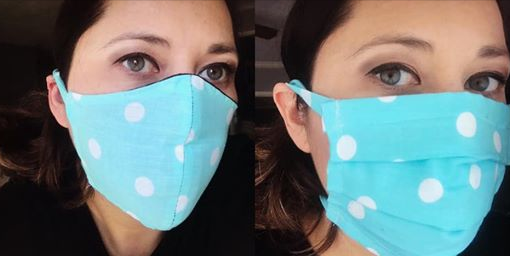Black & Veatch MakerSpace makers are doing some amazing work producing CDC approved masks for front-line workers. They’ve assembled sewing kits from donated fabric from a company called Twirl Connect. In addition, they are making face shields from laser cut plastic and 3D printer plastic with supplies purchased by Black & Veatch.
Makers Angelica Sandoval and Nick Ward-Bopp are leading the cloth mask production effort.
“We knew that many Library staff know how to sew, but we were not sure which materials to use, which mask styles were approved by hospitals, or how to identify hospitals in need,” Ward-Bopp said.
After connecting with Johnson County Emergency Management Services, the makers found that 100 percent cotton fabric is preferred, and the County is accepting donations at their Med-Act station.
With Twirl Connect’s donation of 150 yards of cotton fabric, he and Sandoval put together kits for staff that include fabric, patterns, and thread. Library Adult Services Manager Kinsley Riggs, with help from her mother, spent an entire weekend cutting the fabric for the kits.
As of April 7, more than 35 staff had sewn 517 masks.
“It’s not often we get to have that sort of direct community impact,” Ward-Bopp said. “I’m thankful to everyone who has stepped up to help.”
Donated masks are being delivered through EMS to Johnson County Developmental Supports and will be used for staff who continue to do residential visits.
“We want to help get masks into the hands of medical professionals, first responders, and anyone on the front lines who are treating or working in proximity with COVID-19 patients or public,” Ward-Bopp said. “Making a mask may not seem like a big act, but it could save a life.”
In addition to cloth masks, Makers Thomas Mailloux and Brian Oertel are coordinating the production of 3D printed parts for face shields. Six 3D printers run day and night in the MakerSpace, printing the headbands used on the shields with materials purchased by Black & Veatch. Several printers are on loan from the MakerLab at Johnson County Community College, and other community partners are pitching in with material and hardware to help the effort.
The machines can print two headbands at a time, and each print job takes seven hours, Riggs said. She estimates that the makers are making 18 face shields per day. Black and Veatch has provided most of the materials however, the team needs more supplies.
“Supplies for making masks and shields are starting to become scarce,” said MakerSpace Facilitator Brian Oertel. “It has forced us to be a little more creative in finding materials.”
Filament for 3D printing is becoming hard to find, as well as acetate inserts. Elastic has also been in short supply. Makers are prototyping creative solutions, like using Avery plastic dividers as inserts and pipe cleaners to create a moldable nose piece for the cloth masks.
“The goal is to provide products that can lengthen the life of medical grade PPE or provide people some barrier to infection,” Oertel said. “If we can’t be physically near others, we can still offer something to the community.”
The makers continue to search for creative solutions to supply shortages and will be reaching out to the private businesses for help. They will also keep doing what they do best – creating solutions where it seems like none exist.
“We are investigating printing other things beside face masks,” Oertel said. “There are designs out there for ventilation splitters, to allow multiple patients to use one ventilator.
“If we as makers can do anything to help those people dealing with the pandemic head on, we have to try,” Oertel said.
– Laura Hunt, JCL Internal Communications Manager

